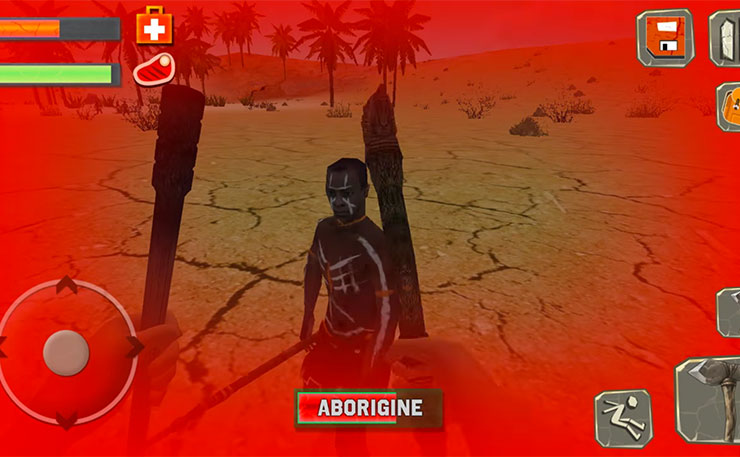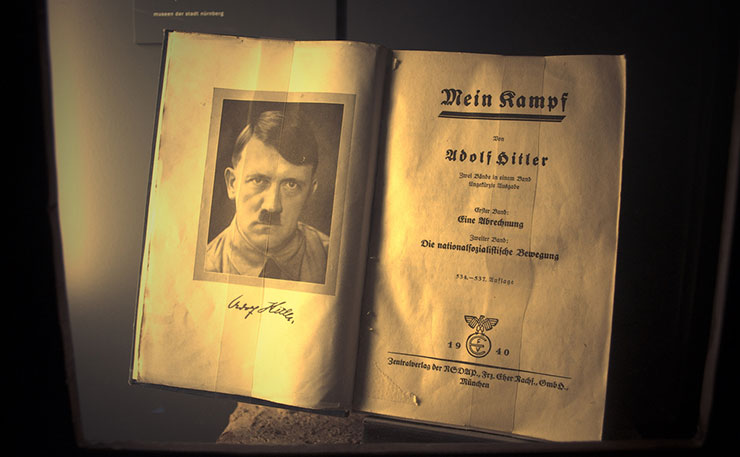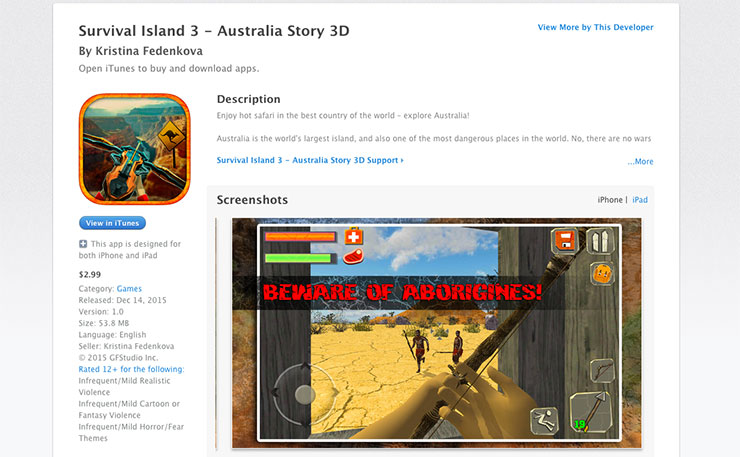You can’t condemn all video games – and gamers – on the basis of one bad one, writes Tom Burns.
Overnight, this news organisation broke the story of an insensitive, ghastly game which encouraged players to fight and kill ‘aborigines’ in a virtual Australian wilderness. A subsequent online petition of app stores and the game’s developer saw Survival Island 3 – Australia Story 3D pulled.
However, in comments and in everyday life, there is a vilification and misunderstanding of video gamers and virtualised evil. I want to say that video gamers aren’t generally (or in this case) at fault and that experiencing virtualised violence or evil in moderation is actually a good thing.
First let us focus in on the case at hand. The player, R2Darksaber, who posted video footage of himself playing Survival Island 3, is not a bad person per se. He is only a bit naive and does not appreciate Australia’s history, it seems. The developer, on the other hand, might have some explaining to do (more on that later).

Interestingly, R2Darksaber actually at first thinks the ‘aborigine’ will be his friend and attempts to get his attention. It’s a very simple game, technically speaking, and he fails in drawing attention to his character (probably because this isn’t technically possible within the game).
He then asks himself, “What will happen if I hit him?” This is a pretty natural thing to ask in a survival game, and especially one of this sort. A popular game in a similar genre would be Minecraft, and many players would ask the same question when they meet different non-player characters.
This sort of question isn’t asked in malice but asked in technical curiosity, i.e. “I wonder what will happen if I do A. Will B or C eventuate, or will anything happen at all?”
Asking such a question and testing a game’s limits and programming is done out of curiosity, and I doubt in this example that there’s any hatred on the part of the player.
Many video games like this include the ability to kill non-player characters. Perhaps the most extreme sorts in the broader sandbox or open-world genre would be the Grant Theft Auto (GTA) series.

There have been a great many studies on such games and their effects on young people. The effects are mixed, neither purely good nor purely bad. On the one hand, players get very good at problem solving and exploring creative options to problems, but can get obsessed with games, playing them, or their content.
There are also some games which include a huge amount of role-playing, where someone playing the game might not necessarily play as if they were themselves, but as if they were someone else. This can lead to greatly improved empathy skills, though such games can sometimes be the most dangerous (when taken to their nth degrees), because the player can ‘become’ the character.
I mention this because there have been very teachable and morally significant examples of role-playing games which almost encourage players to experience what it was like to do an evil thing – not because doing an evil thing should be encouraged, but because understanding how someone comes to do an evil thing is an important part of understanding life.
In the realms of literature, history, and politics, this might be akin to reading Mein Kampf or similar – it’s a horrid book with some awful ideas, but it sheds light on what can lead people to do horrible things and it might (for that reason) help us prevent similar ideas from gaining traction and causing similar horrible events.

It’s notable in this example that in his last video of his series on Survival Island 3, R2Darksaber seems to admire and respect this story’s ‘lost tribe’, which he has found and is helping (as they are helping him). They apparently forgive him for killing one of their members, saying they disliked him and had in fact planned to kill this now former member.
This, if true, is a pretty awful (and awfully convenient) storyline to follow and seems terribly unrealistic. However, the outcome for the way R2Darksaber feels, in the end, embodies what I have been arguing: that in games which incorporate role-playing elements, they can help build empathy in the actual player.
However this is a very poor example, and the developer certainly missed a lot of context, a lot of backstory and, I in fact believe, an opportunity. I have read Mein Kampf. The prose wasn’t that compelling (maybe it’s better in the original German), and of course there is plenty of bigotry and totally unjustified hatred. But I’m glad I have read it and I would encourage you to as well.
It gives us a deeper insight into what can incite and motivate racial vilification and violence. I don’t think I’m alone in thinking this, either – in fact, when a critical, annotated edition of the book went on sale in German bookstores earlier this month (the first time it has been printed there in more than 70 years), it sold out instantly.
In the case of Survival Island 3, perhaps the developer missed an opportunity to teach players about what motivated violent colonialists in the frontier wars.
Video games, as a medium, are deeply immersive and have the potential to give us radically new perspectives of people and ideas.
Survival Island 3 was a poorly made and ill-thought game which certainly should have included warnings about violence.
It absolutely should not have had the rating it did (for ages 12 and up) and the developer apparently showed no true understanding of how controversial and serious the ramifications of the virtualised violence it contained.
Nevertheless, this should not lead us to discount video games, even violent ones, or vilify people who play them. In fact, video games which incorporate violence and evil are important teaching tools for life.
Donate To New Matilda
New Matilda is a small, independent media outlet. We survive through reader contributions, and never losing a lawsuit. If you got something from this article, giving something back helps us to continue speaking truth to power. Every little bit counts.





